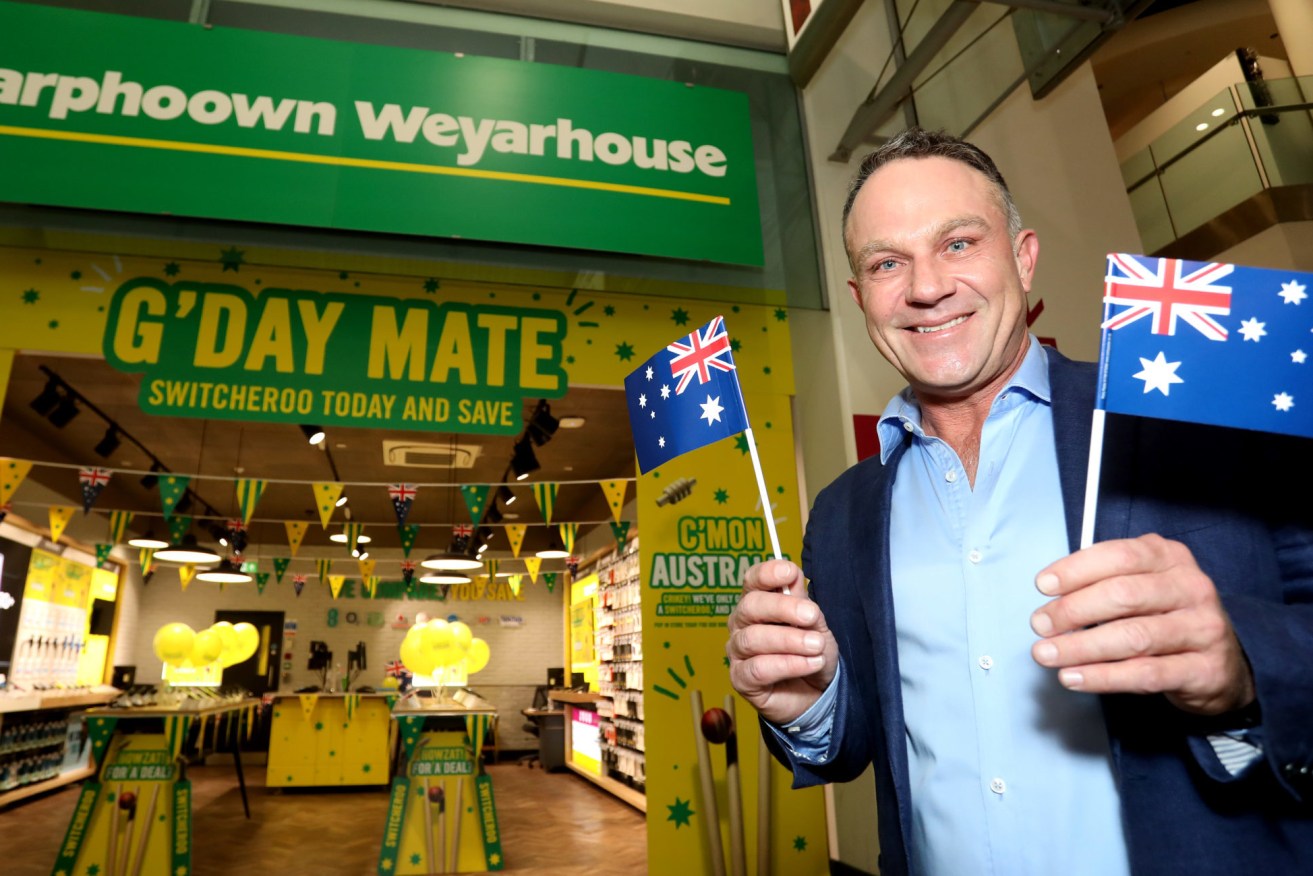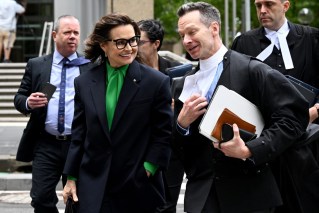Easy to get on the front foot, but in the real world you risk being run out (of town)
Former cricket great Michael Slater’s tone-deaf “blood on your hands” attack on the Prime Minister is a window into just how privileged and pampered our top-level sportsmen and women can be, writes Michael Blucher


Former cricket great may have let his commercial commitments overshadow his better nature in attacking the Prime Minister. Photo credit should read: Isabel Infantes/PA Wire.
As a Test opening batsman, Michael Slater had a rather unfortunate habit of getting himself out in the 90s.
Heck of a player, compelling to watch, but a bloke who could never quite get it right – at least not in a manner that did justice to his extraordinary talent.
Wind the clock forward 20 years and Slater, with his COVID-related Twitter rant, hasn’t just capitulated in the nervous 90s, he’s run himself out without facing a ball.
“Shame on you Mr Morrison, there’s blood on your hands,” Slater protested when he learned the Prime Minister had temporarily closed the borders to all air traffic out of India, IPL cricket luminaries of course included, regardless of their strike rate or number of wickets in the globe’s most-monied, least consequential cricket tournament.
Imagine that – no preferential treatment for highly paid professional athletes (in Slater’s case high-profile commentator) who, armed with exactly the same knowledge as everybody else, chose to travel to India and chase the riches.
Poor little schnookums.
It’s surprising somebody didn’t suggest Australia send a private jet to bring them all home with their kitbags, brimming to the zipper with rupees.
Wait – that’s right. Somebody did suggest that. Something about Cricket Australia “owing them”, on account of the 10% commission the governing body receives from every IPL contract.
Imagine such a draconian financial impost, in return for the investment made in each and every one of them since the age of what – 12? Sounds fair to me.
Back to Slater, has there ever been a more tone-deaf demand placed on the leader of a western world country? And there wasn’t just one. After bashing the PM over the head with his Gray Nicholls Scoop once, he’s then gone into bat again.
Second innings. Middle and leg, please umpire. “I’ll challenge you to a debate anytime, PM.”
From his beach hut in the Maldives, Slats is clearly having trouble tapping into the mood of his fellow countrymen and women.
If he has the luxury of internet access, it might be worth logging on and reading some of the vitriol being spat in his general direction.
Then again, perhaps not. He mightn’t ever return to Australian shores.
I sifted through more than 100 comments responding to a Fox Sports article without finding one vowing support for Slater, or for that matter any other “big top” entertainer who’d travelled to India for the annual T-20 cricket circus.
It’s not like they were over on the sub-continent, sweating it out in their “baggy greens”, is it? This time of year, they’re all individual guns for hire. cashing in on the obscene riches served up annually by the IPL.
Which reminds me of a conversation I overheard a few years ago between two of the country’s youngest and brightest: “If you go up to the IPL and don’t clear US$300K, it’s hardly worth going…” Naturally.
Under normal circumstances, I say good luck to them. Dance down the wicket in Mumbai, hit as many as you can into the bleachers, and snaffle every IPL dollar possible out of those cash-rich Indian franchises. You’ve worked hard. You’ve earned the right – treat it like the crude commercial exercise that it is.
But this year? Seriously? You were better off at home. In your crease. Wisdom of hindsight sure, but tell me the buzzards weren’t circling?
Without for a moment throwing a blanket over every cricketer, footballer, tennis player, golfer etc who’s making a living from playing sport, professional athletes can be good for this type of self-importance. Remember earlier in the year, the tennis players bleating about their training regimes in Melbourne?
Most athletes are, by nature, singular in their pursuit of excellence, self-focused, if not a little self-absorbed. That’s not a criticism, it’s an observation. They almost have to be to achieve the lofty heights to which they aspire.
Too much head space allocated to the needs and circumstances of others distracts them from the main game – winning, getting ahead, being the best they can.
Anybody who works within an elite sporting environment will tell you much the same thing. It’s all about the team, until it’s not. Come crunch time, it’s “numero uno” – first, second and third.
On Ashes tours, assistant coaches relay stories of tail-end batsmen not being afforded a single decent net session – in three months – on account of the obsessive demands of the top order batsmen. Net hogs, putting their own requirements before the broader interests of the team.
Not all, of course, and there’d be some who weren’t even aware of the consequences of their actions, so obsessive is their pursuit of perfection. But it’s real, and it triggers head shaking and resentment, if not internally, then certainly around the periphery.
The other reality of professional sport – Michael Slater again providing the insight – is how insulated a lot of top-flight athletes are from “the real world”.
Again, no fault of their own – that’s just the environment in which they operate.
For their short time in the sun, elite athletes live a surreal existence, particularly in team sports, where practically every day-to-day decision is mode for them – where to be and when, what to wear, what eat, how hard to train. There’s even guidance in the perfunctory disciplines, like how to sleep, and how to invest your money.
At some level, thinking for yourself becomes almost optional. There are stories of intelligent athletes in retirement, missing international flights on account of the team manager not being there to tap them on the shoulder: “Time to go, here’s your boarding pass. Gate 26.”
One NRL player racked up $26,000 in parking fines and tolls, because he didn’t know what to do with them. Another asked his club to sort out the pressing issue of overdue DVDs from “Video Ezy”. And did he really have to pay the $12 in late fees?
Are most professional athletes like that? Of course not. There are many strong willed, self-reliant individuals who take total ownership and control of their life.
The point remains, the bubble of professional sport spawns large schools of mullet, being swept along mindlessly with the tide. They are not remotely interested in the minutiae or complexity of any situation until it adversely affects them.
Adding to this, the more difficult conversations, for instance contract negotiations – where they might have to look somebody in the eye and attach a price to their talents – those discussions are usually left to a third party. Talk to my manager. More convenient, more commercial, and eminently more comfortable.
None of the above makes athletes bad people. They are just products of a system, striving relentlessly for the highest of high performance.
It’s only in times like COVID, imperfect times, that they’re asked to self-reflect, to take a peek at what the rest of us are looking at, every day of our lives.
In the fullness of time, Michael Slater et al might come to acknowledge that.
But I wouldn’t be holding my breath.












